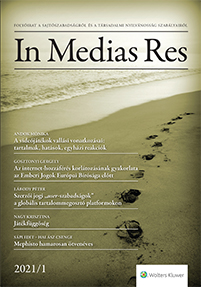Video game addiction
Child protection aspects of the regulation on video games with addictive gameplay patterns
Keywords:
child protection, video games, self-regulation, problematic video game use, loot boxAbstract
Among the risks that can be identified in the context of excessive use in the new media environment, the study addresses the issue of problematic game design patterns that pose a risk to children’s health and raise regulatory issues. Based on research into the psychological mechanisms of problem gaming, it argues that a self-regulatory approach to video games is no longer an effective protection against excessive use. In the PEGI age rating system for video games, the assessment of the risk of developing addiction to video games is not sufficiently emphasised and does not ensure prevention. In order for the use of parental control systems offered by technology to be effective in protecting children, it is necessary to review the classification of video games and to create an information environment that helps parents make informed choices. The role of video games in children’s media use is the basis for treating video games as a medium in their own right, which points the way for regulation towards media law solutions for child protection.
Downloads
Published
How to Cite
Issue
Section
License
Copyright (c) 2021 Krisztina Nagy

This work is licensed under a Creative Commons Attribution 4.0 International License.


